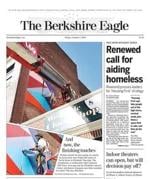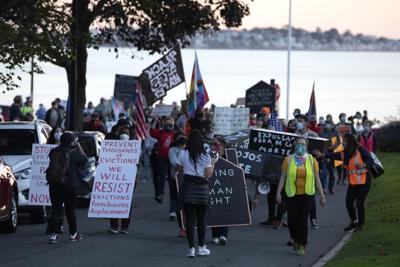The entire Berkshire County delegation to the statehouse, the mayors of North Adams and Pittsfield, and several local groups have joined a call for the Legislature to protect struggling tenants and homeowners while making it easier for mom and pop landlords to access the rent they are owed.
More than 2,700 evictions have been filed in the four Western Massachusetts counties since the state eviction moratorium expired in October, 20 Western Massachusetts members of the Legislature said in a Wednesday letter to leaders of the Joint Committee on Housing. That number includes 2,036 filings in Hampden County, 354 in Berkshire County, 207 in Hampshire County and 139 Franklin County. Beyond that, 585 properties in the four counties are in danger of foreclosure.
“As the more aggressive Delta variant surges and COVID numbers tick up across the Commonwealth, we believe it is the state’s duty to act immediately to protect our constituents,” lawmakers said, advocating for legislation known as the COVID-19 housing equity bill.
Supporters are hoping that a Thursday afternoon hearing before the Joint Committee on Housing will build momentum for the bill, which would require landlords to pursue rental assistance programs before filing for eviction, streamline the application process for rental assistance and prevent forced removal of tenants who are likely to become homeless or who are at elevated risk for COVID-19.
It also would require mortgage forbearance based on federal policies, and temporarily pause foreclosures and no-fault or no-cause evictions.
While some have characterized the bill as a new state “moratorium,” supporters of the bill say that is an inaccurate description.
“If there are violations of the tenancy agreement that are not based in nonpayment of rent, you can still evict,” said Pamela Schwartz, executive director of the Western Massachusetts Network to End Homelessness. “This is true eviction diversion, where there are restrictions when there is COVID-related nonpayment or extreme vulnerability of tenants to COVID-19.”
Real estate groups opposed to the bill have called it a moratorium, as have some media reports. Opponents have expressed concerns that the bill would make it easier for tenants to stay past the end of a lease or fail to pay rent.
Schwartz argues, however, that if landlords’ true goal is to collect the rent they are owed, the bill would allow them to do that. Passing the bill, advocates say, would ensure that rental assistance programs are functioning as designed so that the state avoids a displacement crisis when the new federal eviction moratorium, which the Massachusetts Trial Court has said applies to all Massachusetts counties, expires Oct. 3. The state still has hundreds of millions of dollars available for rental assistance programs, provided by the federal government.
“[The bill] is putting it into the hands of the agencies that are there, ready and working to get the rental assistance out the door, and this law allows the time and the ability to do that without ever entering the courthouse,” Schwartz said.
Now, it can take weeks for assistance applications to be processed, and advocates want to make those programs easier for tenants and landlords to navigate so that landlords do not feel the need to file for eviction when nonpayment is the only issue.
Even if an eviction filing does not result in removal, that filing remains on a tenant’s record and often poses a barrier to future efforts to find housing because landlords can search eviction records. Schwartz added that people of color in Massachusetts are far more likely to rent than white residents, making it “especially urgent to address the racial inequity that underlies homelessness and this eviction crisis,” she said.
“They may have gotten rental assistance in the next week, but that doesn’t take away the trauma of a threatened eviction or an eviction record held against them for all of their future efforts to find housing,” Schwartz said.
Several local groups and leaders signed a separate letter to Gov. Charlie Baker and the Legislature urging passage of the bill. North Adams Mayor Tom Bernard and Pittsfield Mayor Linda Tyer indicated their support, as did the Berkshire Community Action Council, Berkshire Community College, Berkshire Housing, Berkshire Immigrant Center, Berkshire Regional Planning Commission, Berkshire United Way, MassHire Berkshire Career Center and Northern Berkshire United Way.
Tyer said in a statement that she supports the bill “because we know the economic after-effects of the pandemic have had a devastating impact on countless residents.” Berkshire Community College President Ellen Kennedy also referenced the pandemic’s impact on BCC students in testimony she submitted to the Legislature.
Since January 2019, the Berkshire Community College Foundation, with help from private philanthropy, has distributed nearly $7,000 in housing-related emergency aid to students, Kennedy said.
“Covid-19 took away some of my support network,” wrote one student, who was a month behind on rent, in an application for aid. “My mom lost her job and she was the one helping me. Now she is unemployed and I really have no one to turn to for financial help.”
Even before the pandemic, around one in 10 students experienced some form of homelessness, and just under half were housing insecure, Kennedy wrote in her testimony.
“We know through the voices of our students, alumni, and community that addressing this issuewill expand opportunities for the general community to thrive,” she said.
Residents can submit written testimony for the bill through 5 p.m. on Friday but must sign up for an account at malegislature.gov.


